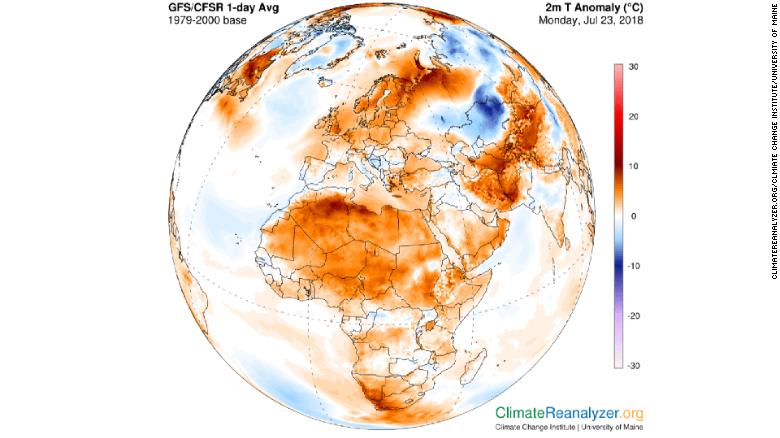Weather and climate are not the same thing. We can and do have weather events that that are extreme. Often such events are attributed to climate, but the subject matter experts generally tend to pause and not make that leap.What about the current heatwave, is that an extreme weather event, or can we attribute an underlying global warming effect in play?
In 1976 the UK had a long dry summer. Once again in 2018 the UK is experiencing a long dry summer. Is 2018 simply an outlier and a repeat of what happened in 1976 or is it different?
1976 vs 2018
Consider it in a global context. If you examine one specific region you can and will find extremes. Here for example is what happened globally in 1976. Notice several hot blobs with one over the British Isles and the contrast to the rest of the globe …
Now compare that to what is going on globally in 2018 …
Clearly on a global scale 2018 is not about one isolated event in just one region. Something is happening on a global scale.
Is this a surprise?
Not really. Global temperature rises are fuelling heatwaves. Climate models have been telling us that we can and should expect longer more extreme heatwaves and so here we are.
The world is hot, on fire, and flooding. Climate change is here.
Eric Holthaus has collected together within one Grist article a description of some of the more notable global events that have been making the news …
Wildfires have ripped through towns in Greece, floods have submerged parts of Laos, and heat waves have overwhelmed Japan. These are striking examples of climate change playing out in its deadliest forms, and they’re making the term “natural disaster” an outdated concept.
Here are a few more nuggets of truth I’ve mined from that same article. They all link to evidence that verifies what is being laid out
…This is already Greece’s hottest year on record….
… the number of fires this year is 43 percent above normal….
…Greece and much of the Mediterranean region is projected to turn into desert over the next several decades, and there are signs that this shift has already begun. As the region’s native trees die off and urban areas expand into neglected forests, firefighting resources are becoming woefully overmatched….
…It’s the hottest month of one of the hottest years in the history of human civilization, and unusual wildfires are sprouting up all over the map. Sweden has called for emergency assistance from the rest of the European Union to help battle massive wildfires burning north of the Arctic Circle. Across the western United States, 50 major wildfires are burning in parts of 14 states, fueled by severe drought….
… high temperature records have been set on nearly every continent. On Monday, Japan had its hottest temperature in recorded history — 106 degrees Fahrenheit — just days after one of the worst flooding disasters the country has ever seen.
Algeria has recorded the highest reliably measured temperature in Africa, 124 degrees Fahrenheit. In late June, the temperature never dropped below 108 degrees Fahrenheit in Oman — the highest overnight low temperature anywhere in the world….
… and on and on.
What is happening is not a local extreme event, this is global.
Climate change is here, and this is just the beginning.
We have failed to cut greenhouse emissions. While that continues we will reap the inevitable consequences.
Further Reading
- Grist: The world is hot, on fire, and flooding. Climate change is here.
- CNN: Record-breaking summer marches on to the beat of climate change
- CNN: Japan: Heat spikes to 41.1C near Tokyo as high temps to continue until August
- Slate: Can We Blame the Summer Heat Wave on Global Warming?
- CityLab: The European Heat Wave Is Brutal
Tweets
In the past few days the coverage by the @nytimes of the reality of #climatechange, including links to disasters & extreme events, has been superb: the Greek fires, the disappearing Lebanese cedars, impacts on fish and manufacturing, the growing youth #climate movement… Kudos.
— Peter Gleick (@PeterGleick) July 24, 2018
Ample evidence links worsening fires with human activity.
On our current course, Greece and much of the Mediterranean region is projected to turn into desert over the next several decades, and there are signs that this shift has already begun.https://t.co/0GYHRMfOk2
— Eric Holthaus (@EricHolthaus) July 25, 2018
Yesterday, Japan had its hottest temperature in its recorded history—106°F.
Today, Japan declared an official natural disaster—22,000 people are in the hospital, and the heatwave shows no sign of breaking.
No mention of climate change in the @nytimes:https://t.co/k1Jcv1BqeW
— Eric Holthaus (@EricHolthaus) July 24, 2018
July 23, 2018 was a day of record-breaking heat in Texas. An all-time high temperature record of 114°F was set in Waco, along with numerous broken daily records shown on the map of number 1 rankings yesterday! pic.twitter.com/Y03tw3nMtW
— Texas Climate Office (@climatexas) July 24, 2018
"Why is Europe going through a heatwave?" via @AdamVaughan_UK of The @Guardian: https://t.co/1oK0mrW4fm
— Michael E. Mann (@MichaelEMann) July 24, 2018
Climate change here, now:
– Wildfires raging in Sweden, Greece, Siberia
– Global heatwave smashing records from Japan to the Arctic
– Typhoons battering Asia
– US West about to be set ablaze
– Hundreds dead, millions relocated, $billions lostWAKE UP WORLD pic.twitter.com/zP4rCwoWvt
— Assaad Razzouk (@AssaadRazzouk) July 24, 2018
https://twitter.com/BBCJamesCook/status/1021652233543331841
Take a look at the data, and it's pretty clear. Summers are getting hotter worldwide. https://t.co/zs7KuuQCNZ
— Eric Holthaus (@EricHolthaus) July 25, 2018
